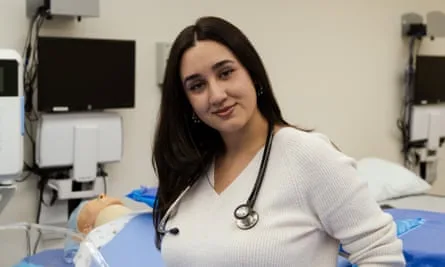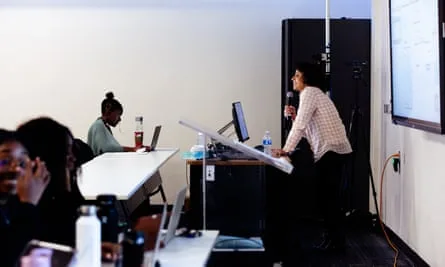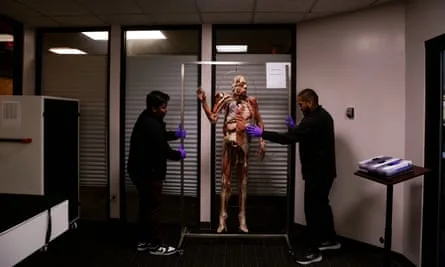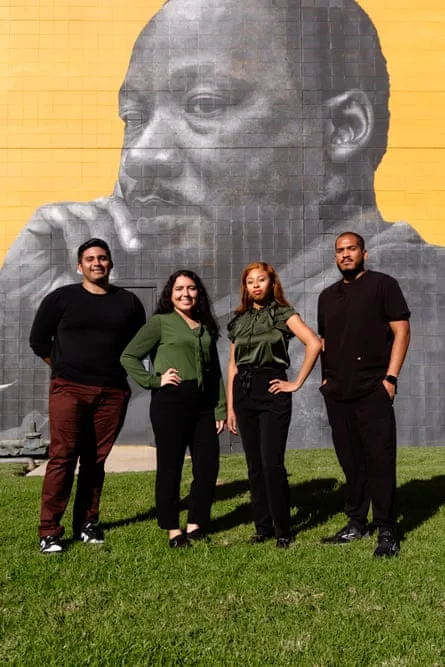It was too late for Sanam Ahadi’s grandmother, Karima Lutfi.
Ahadi’s family, originally from Afghanistan, had feared taking Lutfi to the hospital when she contracted the Covid-19 virus early in the pandemic. Information was low. Visitors were restricted, and the unknown was inescapable, including the virus’s possible deadliness among older adults. In Lutfi’s case, there was also a language barrier.
After two weeks, Lutfi’s condition worsened, so Ahadi’s family, who had fled a war in their homeland in the 1980s, took her to an emergency room in Irvine, California, a 45-minute drive from where they lived in Anaheim, hoping care there would be better resourced.
When they arrived, a doctor told them about a monoclonal antibody treatment that could have helped Lutfi. But by that point, she was too ill.
Lutfi died in the hospital a week later.
This experience pushed Ahadi to apply to medical school with the goal of getting lifesaving medical information and care to people in communities where decades of underinvestment can manifest in preventable deaths.
“I realized that this is going to happen to other people and other families,” Ahadi said. “There’s always going to be a language barrier, there’s always going to be health inequity. I don’t want other families to go through what I went through with my grandma.”
In addition to helping open a monoclonal antibody transfusion center in her neighborhood in Anaheim, Ahadi became one of 60 students, chosen from nearly 1,000 applicants, to make up the inaugural class of medical students at Charles R Drew University (CDU) of Medicine and Science, a private, historically Black graduate school in a south-east Los Angeles neighborhood called Willowbrook, between Watts and Compton.

The university, named after a pioneering Black surgeon and scientist known as the father of the modern blood bank, was founded in 1966 following the Watts rebellion to fill gaps in medical care and bring more Black doctors, nurses and researchers into the field. Since then, it’s become one of the nation’s top producers of Black doctors alongside medical schools at historically Black colleges and universities (HBCUs) including Howard University and Morehouse College.
Amid the progress made by Black medical schools, the proportion of Black doctors in the US has risen a mere 4% between 1900 and 2018, according to an April 2021 study that analyzed historical trends, published in the Journal of General Internal Medicine. In the majority Black and Latino communities surrounding CDU, having a doctor who comes from the same racial and cultural background and can speak the same language can add years to someone’s life – while the lack of it can shave years.
For decades, this lack of diverse physicians, combined with factors like patients being underinsured or housing insecure, has led to health inequities that range from diabetics having a higher likelihood of leg or foot amputations to levels of infant death almost double those of the rest of Los Angeles, according to a 2023 community health needs assessment by Martin Luther King Jr community hospital, a safety-net facility across the street from CDU that serves 13% of LA county, 72% of whom rely on government-sponsored healthcare.




Before earning accreditation in November 2022, CDU trained medical students through a partnership with the University of California, Los Angeles. But in four years, a new generation of physicians will be the first to get diplomas bearing solely the Charles Drew name.
“That had always been the goal here at the university, to have our own independent medical program,” said Deborah Prothrow-Stith, the dean of the college of medicine.




Prothrow-Stith has been dean since 2016, and in that time she’s seen students become integrated into the community through a street-medicine rotation, where students provide locals with rapid HIV testing and unhoused people with health screenings. This work, Prothrow-Stith says, will prepare students for the realities of working in a field with few Black and Latino physicians and caring for people who lack access to consistent medical care.
“We are going to prepare them as best as possible for the uphill battles,” she said. “Knowledge and lived experiences are missing in medicine. We need this class to be very successful, and we need them to have strategies to change mindsets in order to get medicine to do some of the things differently.”
after newsletter promotion
Laila Cross, a CDU student who previously worked at a Boston-area nutrition clinic for children who were struggling to meet growth milestones, said supportive and appropriate healthcare has to start at birth.
“I saw how things like poverty and systemic disenfranchisement from an early age can set you either on a good track with your health or on a track where you’re going to have the potential for lifelong struggles,” she said.
Cross plans to pursue a career in maternal child health, where she hopes to provide babies and children with long-term healthcare and connect families with wraparound services, from taxi vouchers to get people to appointments to behavioral health professionals who can support people’s mental wellbeing.
“If we intervene early, there’s a lot that we can do to foster and grow someone’s potential,” she said. “The more people you can bring to the table and incorporate into the healthcare team to give a variety of services, the better job you can do of tackling those systemic issues.”
For the 60 students in CDU’s first cohort, the focus on how factors such as housing, reliable transportation and proximity to pharmacies and clinics affect physical health was an attractive draw. Some had planned to attend other schools they had been accepted to, but pivoted to CDU upon the university gaining accreditation and later accepting students.




“I was already wrapping my mind over going out of state, and I was sad because my heart is in the Latino and minority communities,” said Martha Romero, a CDU medical student. “I’ve never been out of state, but it seems very white. So when I got the CDU acceptance, I was elated.”
Growing up in Santa Ana, a majority Latino city in Orange county, Romero says, she watched people close to her lose their limbs and vision to treatable ailments like diabetes and hypertension. While working for a community health program, Romero met a Latino doctor who inspired her to become a trusted source of health information for those she related to and grew up around.
“I got to see a lot of misconceptions about medicine just be debunked by just having access to somebody. I want to do that for my community,” she said.
For CDU administrators, the inspiration Romero found is what they hope their medical students will share with local students and residents of south and south-east Los Angeles. In addition to the impact on diversity in medicine, local officials and university leadership hope the medical school will drive the area’s economy upward, create jobs on campus and bring local people into the medical field through training them to work in clinical settings, and engaging with and mentoring students in kindergarten through 12th grade.
“There’s nothing like training people from the communities that they’re going to serve, because that’s where it gets authentic,” said Prothrow-Stith. “That’s where the level of empathy and the appreciation of the humanness comes in. It’s what medicine has needed.”


